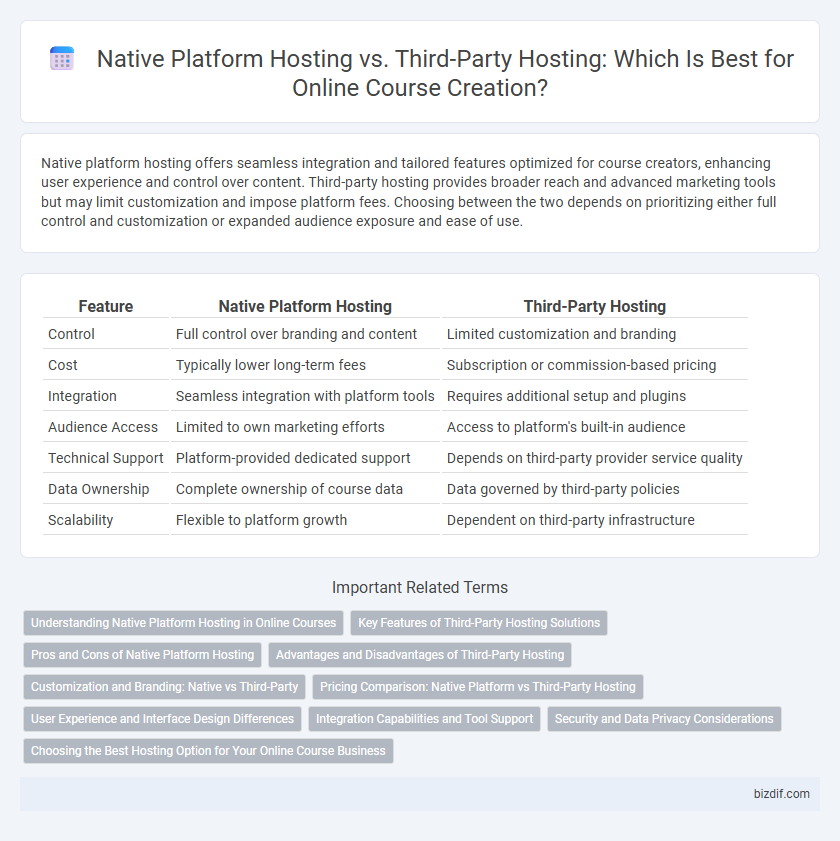Native platform hosting offers seamless integration and tailored features optimized for course creators, enhancing user experience and control over content. Third-party hosting provides broader reach and advanced marketing tools but may limit customization and impose platform fees. Choosing between the two depends on prioritizing either full control and customization or expanded audience exposure and ease of use.
Table of Comparison
| Feature | Native Platform Hosting | Third-Party Hosting |
|---|---|---|
| Control | Full control over branding and content | Limited customization and branding |
| Cost | Typically lower long-term fees | Subscription or commission-based pricing |
| Integration | Seamless integration with platform tools | Requires additional setup and plugins |
| Audience Access | Limited to own marketing efforts | Access to platform's built-in audience |
| Technical Support | Platform-provided dedicated support | Depends on third-party provider service quality |
| Data Ownership | Complete ownership of course data | Data governed by third-party policies |
| Scalability | Flexible to platform growth | Dependent on third-party infrastructure |
Understanding Native Platform Hosting in Online Courses
Native platform hosting in online courses offers seamless integration with built-in tools for course creation, marketing, and student management, enhancing user experience and operational efficiency. It provides greater control over content delivery and branding while ensuring optimized performance tailored to the platform's infrastructure. This hosting approach reduces dependency on external services, enabling faster updates and dedicated support specific to the educational platform.
Key Features of Third-Party Hosting Solutions
Third-party hosting platforms for online courses offer advanced features such as integrated payment gateways, built-in marketing tools, and customizable landing pages that streamline course promotion and sales. These platforms provide analytics dashboards to track student engagement and course performance, enabling data-driven decisions to optimize content and pricing strategies. User-friendly interfaces and robust customer support enhance both instructor and learner experiences, making third-party hosting an efficient solution for course creators seeking scalability and professionalism.
Pros and Cons of Native Platform Hosting
Native platform hosting offers seamless integration with built-in tools tailored for course management, enhancing user experience and simplifying content updates. However, it may limit customization options and restrict access to broader marketing channels compared to third-party platforms. Course creators benefit from reliable support and enhanced security but often face platform-specific fees and less control over learner data.
Advantages and Disadvantages of Third-Party Hosting
Third-party hosting platforms offer streamlined course setup with built-in marketing tools and wide audience access, enhancing course visibility and sales potential. However, they often impose platform fees and limit customization, potentially reducing profit margins and branding control. Reliance on third-party terms also presents risks related to data ownership and platform stability for course creators.
Customization and Branding: Native vs Third-Party
Native platform hosting offers extensive customization options, allowing creators to tailor course design, user interface, and branding elements to align closely with their unique identity. Third-party hosting often limits customization due to predefined templates and branding restrictions, which can dilute a creator's brand presence. Native hosting enhances brand consistency and user experience by providing full control over visual elements and course structure.
Pricing Comparison: Native Platform vs Third-Party Hosting
Native platform hosting often provides inclusive pricing models with no additional transaction fees, making it cost-effective for creators with growing course sales. Third-party hosting platforms usually charge monthly fees plus extra charges per transaction, potentially increasing overall costs as enrollment scales. Evaluating pricing structures alongside anticipated student volume helps select the most economical option for sustainable online course delivery.
User Experience and Interface Design Differences
Native platform hosting offers a streamlined user experience with interfaces specifically tailored to the course creator's brand, providing seamless navigation and cohesive design elements that enhance learner engagement. Third-party hosting platforms often impose standardized templates and restricted customization options, which can limit the ability to create a unique and intuitive user interface. User experience on native platforms typically benefits from faster load times and integrated tools, whereas third-party hosts may introduce latency and inconsistent design due to multi-tenant environments.
Integration Capabilities and Tool Support
Native platform hosting offers seamless integration capabilities with built-in course builders, payment gateways, and analytics tools designed specifically for the platform, ensuring streamlined course management. Third-party hosting provides extensive tool support with flexible integrations through APIs and plugins, allowing for customization and connection to a broader range of marketing, CRM, and communication tools. Choosing between native and third-party hosting depends on the balance between ease of use and the need for advanced, tailored integrations in online course creation.
Security and Data Privacy Considerations
Native platform hosting offers enhanced security by integrating data protection measures directly within the course ecosystem, minimizing risks of data breaches. Third-party hosting may introduce vulnerabilities due to external data handling and potential compliance gaps with regulations like GDPR or CCPA. Ensuring end-to-end encryption, data residency control, and adherence to privacy standards is critical when choosing between native and third-party hosting for online course platforms.
Choosing the Best Hosting Option for Your Online Course Business
Native platform hosting offers seamless integration, built-in marketing tools, and direct customer management, enhancing course creator control and brand consistency. Third-party hosting provides broader audience reach and advanced customization but often involves higher fees and less control over user data. Evaluating your business goals, budget, and desired level of autonomy is essential to selecting the ideal hosting option for long-term online course success.
Native platform hosting vs Third-party hosting Infographic

 bizdif.com
bizdif.com